*/
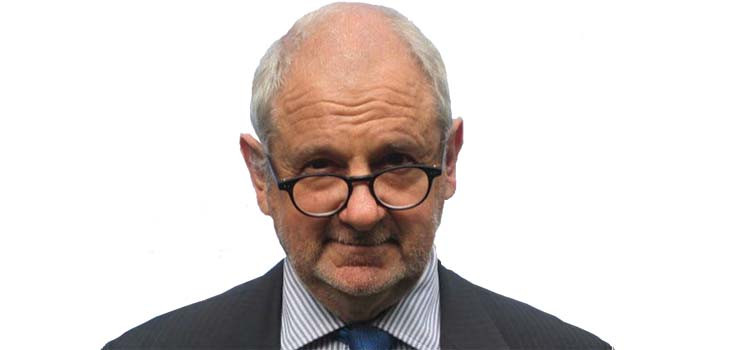
The statement ‘when I hear the word culture, I reach for my gun’ is (wrongly) attributed to Goebbels. Not much of an endorsement! My cultural influences largely predate my call to the Bar in 1967; the demands of practice and family left little space for expansion.
I was, before I even entered my teens, hugely motivated by Louisa May Alcott’s Little Women which fashioned me a feminist. From the Dragon Book of Verse, my orthodox pre-school introduction to English poetry, I was impressed by Shelley’s Ozymandias and its insight into the ephemeral nature of power later; reinforced by my favourite history books, Norman Cohn’s The Pursuit of the Millennium, Oswald Spengler’s The Decline of the West, and George Dangerfield’s The Strange Death of Liberal England. A classicist at Eton, I enjoyed Horacian lyrics and the taste of Tacitus for epigram. Regular visits to the theatre at Stratford-upon-Avon both as a son and a father convinced me that Shakespeare is a first without equals.
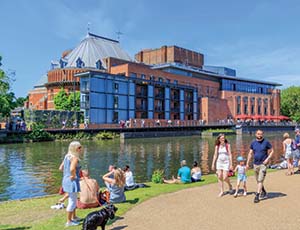
The theatre at Stratford-upon-Avon © High Level/Shutterstock
My musical tastes again reflect the various stages of my life. I became at the Dragon an enthusiast for the Gilbert and Sullivan operas. When adolescence arrived, I found, in fealty to my Russian heritage, Tchaikovsky’s violin and piano concertos in harmony with my romantic moods. Though generally more a Classic FM than Radio 3 person, I am an aficionado of music with a tune – Mozart, Louis Armstrong, Dolly Parton, military marches played by brass bands. Sometimes it was the coincidence of piece and place which left the greatest impression; a performance of Lehár’s Merry Widowin the opera house of what was then East Berlin, when I was masquerading with a press card as a journalist (for Encounter) en route to the Munich Olympics in 1972; or hearing in Hereford Cathedral, on a return visit from an annual trek to Hay-on-Wye where my wife and I sold enough books for which we regrettably no longer had space to cover the cost of our lunch (if not our petrol), a Welsh male voice choir in rehearsal of the hymn Guide Me O Thou Great Redeemer.
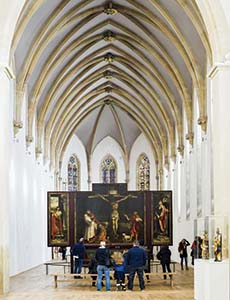
Grünewald’s Isenheim Altarpiece at Colmar © Daniel Schoenen/imageBROKER/Shutterstock
My interest in painting grew, albeit slowly, from a trip to Italy on which my parents took me as a reward for studying Hebrew for my bar mitzvah. I have in consequence a reflex action of making a museum my first port of call in any city new to me. My taste was, again with no consistent theme, for the classics of western art from Raphael via Rembrandt to Renoir, with some outliers such as Grünewald’s Isenheim Altarpiece at Colmar. When my work took me eastwards to Malaysia, Japan and China I was intrigued by the wholly distinctive Asian styles from the spare to the savage. It was my wife who made me appreciate, belatedly, that buildings and not merely their contents command attention – we had two memorable holidays exploring the Loire châteaux and Welsh border castles – and that the whole can be as important as the parts – see our favourite new world cities: Boston, New Orleans, San Francisco.
Films (without fantasy and with a plot) have been my favourite source of entertainment, if not for many years in a cinema; this year’s seen on business class screens on long distance flights; last year’s on DVDs and vintage classics on iPlayer. For me, the heroes of the Golden Age of Hollywood, the awesome foursome of Cooper, Gable, Stewart and Wayne, always strong, sporadically silent, outplayed their modern counterparts, all cardboard cuts of action men or metrosexuals; just as the wit and charm of French films outrank their English counterparts. John Ford and Eric Rohmer are my superstar directors. But I like best films in which virtue valiantly triumphs over adversity – How Green Was My Valley, The Five Pennies, The Inn of the Sixth Happiness, Darkest Hour – which spark my tears.
Sport at its best has been for me an art form as well as an inspiration. I have seen stadium-side every one of Usain Bolt’s Olympic gold medals and poolside every one of Michael Phelps’s. And if I start to speak of Muhammad Ali or Roger Federer I shall never stop. For them, the hackneyed phrase ‘the likes of’ is meaningless. There are no likes.
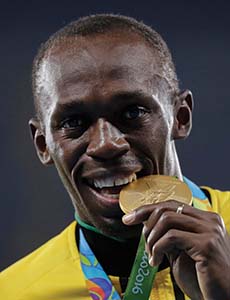
Usain Bolt © Jae C Hong/AP/Shutterstock
Walter Savage Landor penned the line ‘nature I loved and, next to nature, art’. For my part there is no need to order them. Seeing the Himalayas at night through the windows of a Jumbo Jet, Mount Fuji from the windows of the Shinkansen, a moose grazing in the snow from the viewing platform of the Canadian Rockies train, or a scarlet ibis in a forest in Trinidad, who can doubt that, as Satchmo sang, ‘It’s a wonderful world.’>
Can one sensibly analyse what cultural experiences have been an enduring influence in one’s life? I prefer simply to recall fleeting moments of pure enjoyment. Hotel indispensable kit? A hologram of my grandsons!!
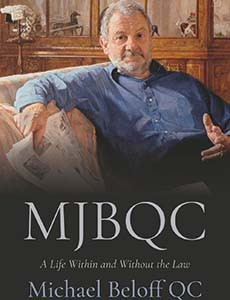

The statement ‘when I hear the word culture, I reach for my gun’ is (wrongly) attributed to Goebbels. Not much of an endorsement! My cultural influences largely predate my call to the Bar in 1967; the demands of practice and family left little space for expansion.
I was, before I even entered my teens, hugely motivated by Louisa May Alcott’s Little Women which fashioned me a feminist. From the Dragon Book of Verse, my orthodox pre-school introduction to English poetry, I was impressed by Shelley’s Ozymandias and its insight into the ephemeral nature of power later; reinforced by my favourite history books, Norman Cohn’s The Pursuit of the Millennium, Oswald Spengler’s The Decline of the West, and George Dangerfield’s The Strange Death of Liberal England. A classicist at Eton, I enjoyed Horacian lyrics and the taste of Tacitus for epigram. Regular visits to the theatre at Stratford-upon-Avon both as a son and a father convinced me that Shakespeare is a first without equals.

The theatre at Stratford-upon-Avon © High Level/Shutterstock
My musical tastes again reflect the various stages of my life. I became at the Dragon an enthusiast for the Gilbert and Sullivan operas. When adolescence arrived, I found, in fealty to my Russian heritage, Tchaikovsky’s violin and piano concertos in harmony with my romantic moods. Though generally more a Classic FM than Radio 3 person, I am an aficionado of music with a tune – Mozart, Louis Armstrong, Dolly Parton, military marches played by brass bands. Sometimes it was the coincidence of piece and place which left the greatest impression; a performance of Lehár’s Merry Widowin the opera house of what was then East Berlin, when I was masquerading with a press card as a journalist (for Encounter) en route to the Munich Olympics in 1972; or hearing in Hereford Cathedral, on a return visit from an annual trek to Hay-on-Wye where my wife and I sold enough books for which we regrettably no longer had space to cover the cost of our lunch (if not our petrol), a Welsh male voice choir in rehearsal of the hymn Guide Me O Thou Great Redeemer.

Grünewald’s Isenheim Altarpiece at Colmar © Daniel Schoenen/imageBROKER/Shutterstock
My interest in painting grew, albeit slowly, from a trip to Italy on which my parents took me as a reward for studying Hebrew for my bar mitzvah. I have in consequence a reflex action of making a museum my first port of call in any city new to me. My taste was, again with no consistent theme, for the classics of western art from Raphael via Rembrandt to Renoir, with some outliers such as Grünewald’s Isenheim Altarpiece at Colmar. When my work took me eastwards to Malaysia, Japan and China I was intrigued by the wholly distinctive Asian styles from the spare to the savage. It was my wife who made me appreciate, belatedly, that buildings and not merely their contents command attention – we had two memorable holidays exploring the Loire châteaux and Welsh border castles – and that the whole can be as important as the parts – see our favourite new world cities: Boston, New Orleans, San Francisco.
Films (without fantasy and with a plot) have been my favourite source of entertainment, if not for many years in a cinema; this year’s seen on business class screens on long distance flights; last year’s on DVDs and vintage classics on iPlayer. For me, the heroes of the Golden Age of Hollywood, the awesome foursome of Cooper, Gable, Stewart and Wayne, always strong, sporadically silent, outplayed their modern counterparts, all cardboard cuts of action men or metrosexuals; just as the wit and charm of French films outrank their English counterparts. John Ford and Eric Rohmer are my superstar directors. But I like best films in which virtue valiantly triumphs over adversity – How Green Was My Valley, The Five Pennies, The Inn of the Sixth Happiness, Darkest Hour – which spark my tears.
Sport at its best has been for me an art form as well as an inspiration. I have seen stadium-side every one of Usain Bolt’s Olympic gold medals and poolside every one of Michael Phelps’s. And if I start to speak of Muhammad Ali or Roger Federer I shall never stop. For them, the hackneyed phrase ‘the likes of’ is meaningless. There are no likes.

Usain Bolt © Jae C Hong/AP/Shutterstock
Walter Savage Landor penned the line ‘nature I loved and, next to nature, art’. For my part there is no need to order them. Seeing the Himalayas at night through the windows of a Jumbo Jet, Mount Fuji from the windows of the Shinkansen, a moose grazing in the snow from the viewing platform of the Canadian Rockies train, or a scarlet ibis in a forest in Trinidad, who can doubt that, as Satchmo sang, ‘It’s a wonderful world.’>
Can one sensibly analyse what cultural experiences have been an enduring influence in one’s life? I prefer simply to recall fleeting moments of pure enjoyment. Hotel indispensable kit? A hologram of my grandsons!!



The Chair of the Bar sets out how the new government can restore the justice system
In the first of a new series, Louise Crush of...
Unlocking your aged debt to fund your tax in...
Possibly, but many barristers are glad he did…
Mental health charity Mind BWW has received a £500 donation from drug, alcohol and DNA testing laboratory, AlphaBiolabs as part of its Giving Back campaign
The Institute of Neurotechnology & Law is...
How to navigate open source evidence in an era...
Brie Stevens-Hoare KC and Lyndsey de Mestre KC...
Sir Geoffrey Vos, Master of the Rolls and Head...
The Chair of the Bar sets out how the new...
No-one should have to live in sub-standard accommodation, says Antony Hodari Solicitors. We are tackling the problem of bad housing with a two-pronged approach and act on behalf of tenants in both the civil and criminal courts